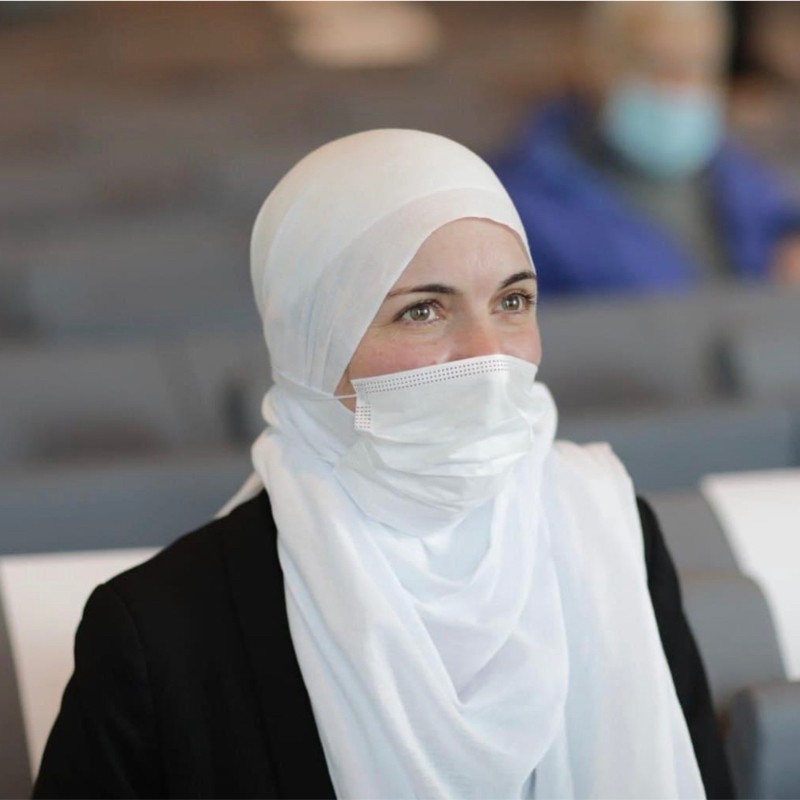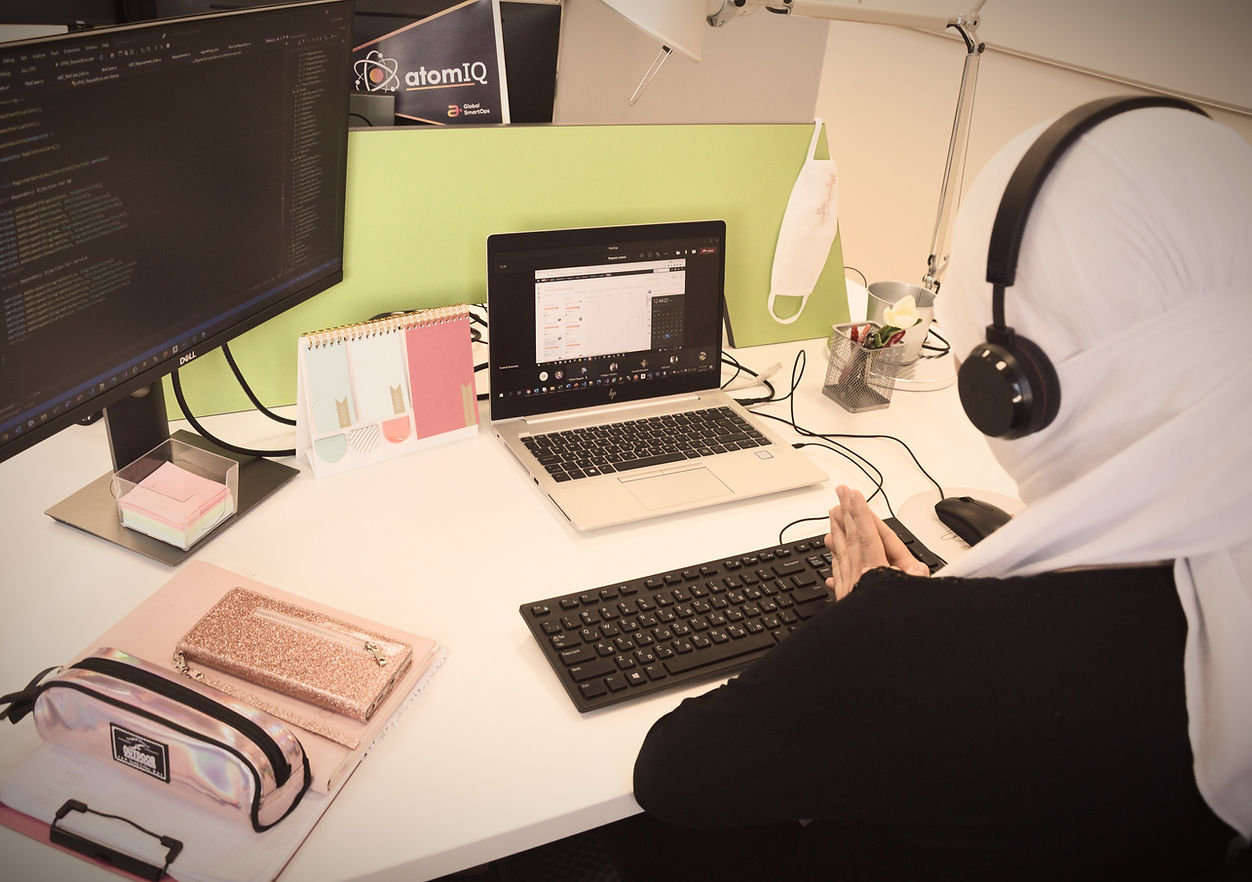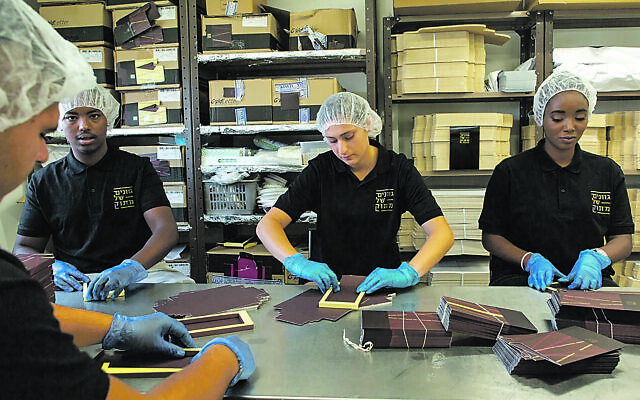How UJIA is recycling donations to support Israelis in need
The Si3 initiative funds 19 organisations in Israel
When Roberta Shem Tov, who lives in the Negev, split from her husband, she didn’t know how she was going to manage the house and feed her five children while also looking after them. But then she heard about a new scheme that trained and gave work to women who could work as virtual PAs.
On the other side of Israel, in the Carmel mountains near Haifa, Druze teacher Maisa Halaby-Elshiekh was pondering how women in her community could find satisfying work outside of the house while still abiding to rules that didn’t allow them to leave their village. Just a few years later, she has close to 100 women working for a hi-tech hub leading teams of coders all over the world; yet still remaining in their village.
They are just a few of the beneficiaries of a relatively new form of giving called investment funding. The company Roberta works for and the one Maisa leads are both beneficiaries of vital start-up funding from British donors to the UJIA (United Jewish Israel Appeal).
The Si3 initiative (the letters stand for Social and three letter ‘i’s for Impact Investment in Israel) means that money donated doesn’t fall into an endless pit of need but, like a pebble being thrown into a pond, ripples out to others. While ‘renewable’ is a term most used when it comes to the environment it is also apt here; the organisations funded by Si3, which are chosen carefully by a team of experts in London, are able to use and reuse that funding, changing their environment for the better.

Altogether the organisation has 19 projects in its portfolio, ranging from a bank specifically for Ethiopian origin entrepreneurs and a company that uses gaming to break down barriers between different groups in Israel, to a child-run chocolate factory that gives struggling kids a wage and confidence.
The chocolate factory scheme is called Gvanim Shel Matok, which is translated as ‘shades of sweetness’. It takes place in several sites in community centres for teenagers who are struggling with schooling to get them off the streets. Si3 has helped fund special kitchens where, in 40 minutes, teenagers can create something beautiful and delicious that is then sold.
“We see it as a sort of incubation scheme – they learn so much on it and we hope that after they have been through it, they return to school or into the workforce,” says social worker Shlomi Forkosh. “At the centre we have all sorts of things to help our children, but this is one of our most successful because they get paid to do training, and by working they are empowered.
“We don’t just train and have them making chocolate. We give them life tools like how to open bank accounts and we show them how important it is to be on time for things. They get involved with the running of the company and they make decisions. But they also have fantastic opportunities – recently they had a stand at a conference, and they got to meet the head of Mossad.
“They often come from dysfunctional and disadvantaged backgrounds but with this scheme they are learning skills for the future. We have so many happy stories from it but one of my favourites was a girl who had had a tough time at home and hadn’t been to school for two years. After being on the scheme, she went back to school and is flourishing.”
For a lot of the schemes the idea is to train people to not only help themselves but to help others.
Living in Mitzpe Ramon, for Roberta work opportunities were slim; the only big employers were the two hotels and while she worked as a receptionist, the shifts were impossible for a single mother of five.
The organisation she works with, Desert19 – which had funding for an office from Si3 – allows for women to work in a range of services such as marketing, graphic design and PA services remotely in their own hours.
 “When I first worked as a remote PA, it allowed me to meet my basic needs – I could work and feed my children. It was life changing,” says Roberta. “As time has moved on, I was promoted and am now head of the department and am doing a job I am proud of.”
“When I first worked as a remote PA, it allowed me to meet my basic needs – I could work and feed my children. It was life changing,” says Roberta. “As time has moved on, I was promoted and am now head of the department and am doing a job I am proud of.”
Mirroring the experience with Desert19, Maisa Halaby-Elshiekh, a religious Druze woman who wanted to help the women around her, started her company, Lotus, with funding from Si3 at the start of the pandemic. She started with 14 women; they were taught to code and are now experts in the high-tech knowledge that is driving Israel’s economy. She now has more than 65, with another 30 signed up for the next training, and the scheme has been endorsed by the Druze religious leadership.
“For many of the women it is the first time they have ever had a salary, the first time they have independence – and when you get that it changes your mindset and how you value yourself,’ says Maisa. ‘I hear a lot from the women about how they appreciate themselves – they have powers they didn’t realise.
“It has an impact on their husbands and even on their children, who are proud to see their mums work and want to learn more themselves about computer science. The women are now part of teams in Israel with all sorts of people from other sections of society and even internationally – we are working a lot with people in India and everyone has become very friendly. This is true diversity in action, and I am so proud of what we do.”
For more information and to help: si3.ujia.org/

Thank you for helping to make Jewish News the leading source of news and opinion for the UK Jewish community. Today we're asking for your invaluable help to continue putting our community first in everything we do.
For as little as £5 a month you can help sustain the vital work we do in celebrating and standing up for Jewish life in Britain.
Jewish News holds our community together and keeps us connected. Like a synagogue, it’s where people turn to feel part of something bigger. It also proudly shows the rest of Britain the vibrancy and rich culture of modern Jewish life.
You can make a quick and easy one-off or monthly contribution of £5, £10, £20 or any other sum you’re comfortable with.
100% of your donation will help us continue celebrating our community, in all its dynamic diversity...
Engaging
Being a community platform means so much more than producing a newspaper and website. One of our proudest roles is media partnering with our invaluable charities to amplify the outstanding work they do to help us all.
Celebrating
There’s no shortage of oys in the world but Jewish News takes every opportunity to celebrate the joys too, through projects like Night of Heroes, 40 Under 40 and other compelling countdowns that make the community kvell with pride.
Pioneering
In the first collaboration between media outlets from different faiths, Jewish News worked with British Muslim TV and Church Times to produce a list of young activists leading the way on interfaith understanding.
Campaigning
Royal Mail issued a stamp honouring Holocaust hero Sir Nicholas Winton after a Jewish News campaign attracted more than 100,000 backers. Jewish Newsalso produces special editions of the paper highlighting pressing issues including mental health and Holocaust remembrance.
Easy access
In an age when news is readily accessible, Jewish News provides high-quality content free online and offline, removing any financial barriers to connecting people.
Voice of our community to wider society
The Jewish News team regularly appears on TV, radio and on the pages of the national press to comment on stories about the Jewish community. Easy access to the paper on the streets of London also means Jewish News provides an invaluable window into the community for the country at large.
We hope you agree all this is worth preserving.






















